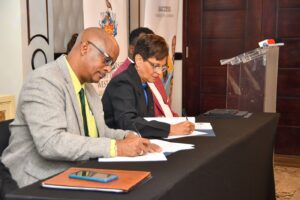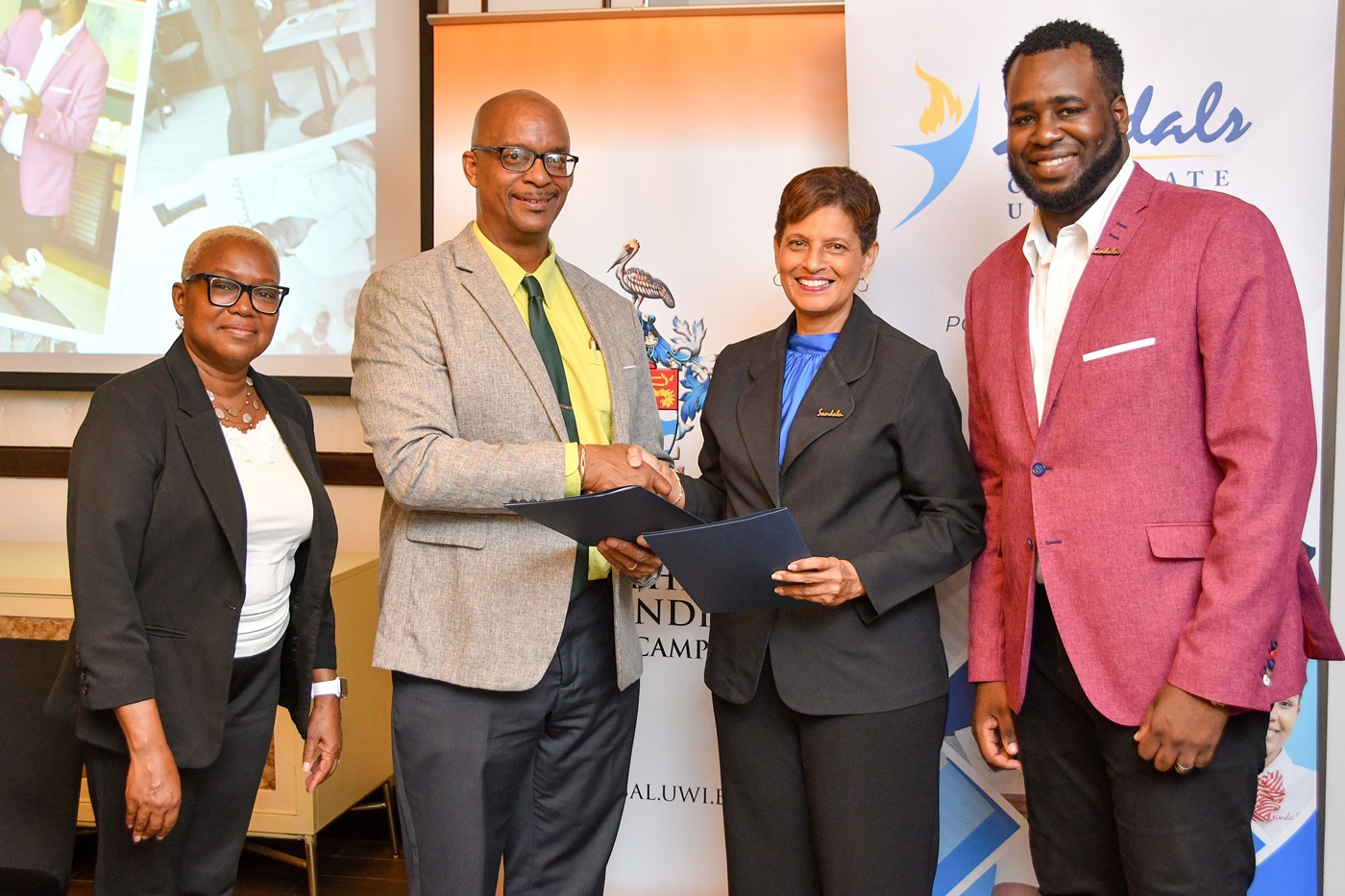~Using AR, VR and XR to train and develop in the Caribbean ~
April 17, 2024 – The Sandals Corporate University (SCU) continues to make significant strides through their multimillion-US dollar project with EON Reality following a recent signing of a Memorandum of Understanding (MoU) between The University of the West Indies (The UWI) Global Campus (UWIGC) and the SCU.
The two-year agreement will allow both institutions to work together to explore and implement mutually rewarding initiatives focused on the development of extended reality projects, using the EON Reality platform.
The MoU, signed during a ceremony hosted at Sandals Barbados, provides a framework for The UWI Global Campus and the SCU to facilitate further cooperation in education and training initiatives across the Caribbean region. Dr. Luz Longsworth, Senior Corporate Director for the SCU, described the event as a historical one, where two great organizations come together to achieve great things. “Both institutions have much in common which allows us to join forces to impact the sustainability of our region. We focus on the development and education of our people and countries of this beautiful Caribbean. This MoU will create a framework for the SCU and The UWI Global Campus to work towards coordinating digital and technology related projects and initiatives across campuses and across the Sandals group.”
Dr. Longsworth went on to share the major areas the MoU will cover, “The UWI Global Campus will provide technical input and subject matter expertise for the development of 3D assets and 360-degree experiences in the development of hospitality training content specifically relating to rooms, food and beverage, bookings, watersports, and others. In turn, the SCU and Sandals will provide internship programmes for students, faculty, and staff at various levels. The MoU also makes provisions for collaborating with other institutions to foster an appreciation of new and emerging technological opportunities in the hospitality industry and to help in the understanding of how tourism can aid in environmental protection, climate change mitigation and adaptation strategies. Finally, it will facilitate the use of technology, including without limitation, AR, VR, XR and AI to boost corporate social responsibility efforts,” she added.
internship programmes for students, faculty, and staff at various levels. The MoU also makes provisions for collaborating with other institutions to foster an appreciation of new and emerging technological opportunities in the hospitality industry and to help in the understanding of how tourism can aid in environmental protection, climate change mitigation and adaptation strategies. Finally, it will facilitate the use of technology, including without limitation, AR, VR, XR and AI to boost corporate social responsibility efforts,” she added.
Dr Francis O. Severin, Pro Vice-Chancellor and Principal of The UWI Global Campus, expressed his gratitude for this revolutionary opportunity to collaborate with the SCU. He shared, “in 2021 The UWI Global Campus made a decision to invest in advanced digital skills for its faculty to help prepare students academically for emerging digital technologies. It is even more important now to introduce and encourage skills to leverage platforms and technologies to generate digitally created goods and services for global audiences. This allows us to eliminate traditional barriers to productive participation like location, gender, and disabilities. These are the values we hold true which opens opportunities to collaborate with likeminded organizations. By harmoniously weaving into the teaching, technological and applied research capacities of the University through XR, AI and other emerging platforms alongside the SCU, we have no doubt we will be better able to support the movement of the Caribbean curriculum.”
He concluded by stating that The UWI Global Campus’ intention is to establish an immersive learning centre for staff, students, and stakeholders to learn, train and perform as efficiently and effectively as possible. “This will be the first of its kind for the region and will usher in a new approach to education and training that engages learners in experiential environments,” he said.
So far, both parties have already begun working on its first of many initiatives, the Digital Immersive Virtual Enhancement (DIVE) Project. Through this project, recorded experiences showcasing coral reefs, dive spots and protected areas will be used to showcase the beauty of underwater experience for tourism purposes but also used to protect the environment through training. It serves as a response to ecological challenges facing our region due to climate change, human impact, and natural disasters.
Photo Captions
Header – (From left) Dr. Karen Rosemin, Head of Digital Learning and Innovation, The UWI Global Campus, Dr Francis O. Severin, Pro Vice-Chancellor and Principal of The UWI Global Campus, Dr. Luz Longsworth, Senior Corporate Director for SCU and Mr. Andre Campbell, Manager E-learning and Technology, SCU all share smiles after the signing of an MoU between both institutions at Sandals Barbados.
Insert – Captured signing the Memorandum of Understanding are Pro Vice-Chancellor and Principal of the UWI Global Campus, Dr Francis O. Severin and Dr. Luz Longsworth, Senior Corporate Director for SCU. The MoU will allow both parties to work together to explore and implement extended reality projects, using the EON Reality platform.


 Caribbean News7 days ago
Caribbean News7 days ago
 Caribbean News7 days ago
Caribbean News7 days ago
 Caribbean News1 week ago
Caribbean News1 week ago
 Caribbean News7 days ago
Caribbean News7 days ago
 Bahamas News7 days ago
Bahamas News7 days ago
 News7 days ago
News7 days ago
 Bahamas News1 week ago
Bahamas News1 week ago
 News7 days ago
News7 days ago











